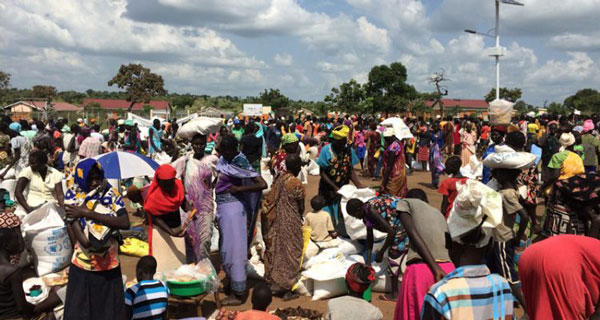
Kampala, Uganda | THE INDEPENDENT | The number of South Sudan refugees in Lamwo District has hit 53,000, following a recent influx recorded in Palabek Kal, Palabek Gem and Palabek Ogili settlements.
The number stood at 49,716 refugees as of July 31, 2019, according to reports by the Office of the Prime Minister and United Nations High Commissioner for Refugees-UNHCR.
The Palabek Settlement Commandant, Julius Kamuza attributes the influx of on acute hunger in Torit State. He, however, says the number of refugees crossing has greatly reduced to an average of six to seven refugees entering through Madi-Opei Immigration border point.
“Last month, most of the refugees fled away because they never had enough rain to support farming. But now we got reports that most of the areas are receiving rain, they are utilizing the rain to grow food crops,” he said.
He notes that the high number of refugees coupled with limited funding from government and development partners especially UNHCR is affecting service delivery in settlement centres. The worst affected are health and education, which Kamuza say need urgent funding to enable them to operate smoothly.
“We currently have crowded schools because of limited space and few teachers compared to the high numbers of pupils. The schools don’t have permanent structures forcing learners to study in tents or outside.
Our health centres can’t offer services effectively to the current numbers of refugees,” he said. Lamwo District Education department recently introduced shifts in primary schools within the refugee settlement centres due to the overwhelming numbers of learners.
Lamwo LC V Chairperson, John Komakech Ogwok has tasked UNHCR and OPM to step up their efforts in ensuring that service delivery in major sectors like health and education is maintained. He says they are worried that the burden of providing essential services to the refugees may be left in their hands since OPM and UNHCR are raising alarm over limited funds.
“UNHCR and OPM need to be on top of things. They seem to be taking things for granted in terms of service delivery that is not matching with the population of refugees. The status of education and health sector in the settlements is worrisome,” Ogwok said.
He says the high numbers are also threatening the environment since most of the refugees depend on wood for constructing shelters, cooking and charcoal burning. The Speaker of Parliament, Rebecca Kadaga recently criticized the international community for failing to fulfill financial pledges made during a Summit held in Kampala, two years ago in support of refugees in Uganda.
While addressing the 10th Conference of Speakers of African Parliaments and Senates at the Pan-African Parliament in Midrand, South Africa last week, Kadaga said Uganda only realized USD 540,000 [about 1.94 billion], out of the total pledges of USD 358 million made during the summit. Uganda hosts some 833,785 South Sudanese refugees according to statistics from the Office of the Prime Minister.
*****
URN
 The Independent Uganda: You get the Truth we Pay the Price
The Independent Uganda: You get the Truth we Pay the Price





